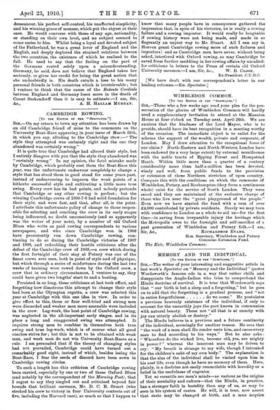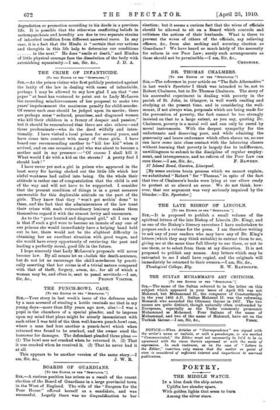MEMORY AND THE INDIVIDUAL.
[To ram Enrroz or TEE " Srrcrirog."] Sin,—The writer of your interesting and suggestive article in last week's Spectator on " Memory and the Individual" quotes Wordsworth's famous ode in a way that rather chills and disappoints the Anglo-Indian who tries to comprehend the Hindu doctrine of survival. It is true that Wordsworth says that " our birth is but a sleep and a forgetting," but be goes on to add that the forgetting is a gradual process, and "not in entire forgetfulness do we come." He postulates a previous heavenly existence of the individual, if only to account for the unearthly joys the poet knows in communion with natural beauty. These not " all that is at enmity with joy can utterly abolish or destroy."
The Hindu believes in a previous and a future continuity of the individual, seemingly for another reason. He sees that " the work of a man shall He render unto him, and cause every man to find according to his ways." But lie also asks : " Wherefore do the wicked live, become old, yea, are mighty in power P" whereas the innocent man may be driven to cry : " My breath is strange to my wife, though I intreated for the children's sake of my own body." The explanation is that the sins of the individual shall be visited upon him in his neat life, even though he have no memory of them. Here, plainly, is a doctrine not easily reconcilable with heredity or a belief in the usefulness of eugenics.
Yet so versatile are men's minds—as various as the origins of their mentality and culture—that the Hindu, in practice, has a stronger faith in heredity than any of us, as may be seen inhis system of castes. He will, it is true, now assert that Caste may- be changed at birth, and a man acquire degradation or promotion according to his deeds in a previous life. It is possible that the otherwise conflicting beliefs in metempsychosis and heredity are due to two separate strains of inherited tradition from different ancestral races. In any case, it is a fact that the Hindu is "certain that our actions and thoughts in this life help to determine our conditions in the next." He does "smile at death," and Hindus of little physical courage face the dissolution of the body with
astonishing equanimity.—I am, Sir, &e., J. D. A.















































 Previous page
Previous page